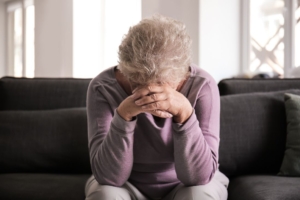A note from Joanna

Pamela (this is not her real name and all identifying information has been changed) was an attractive, well-dressed woman in her 60’s. She was once very active in her neighborhood and served as a volunteer coordinator for a local food pantry. After many years of faithful service, Pamela was asked to step down and was replaced by someone younger, and in her perception, more popular. Soon after that, her husband retired and they moved to a townhome in a neighboring city.
When I met Pamela, she could barely get out of bed. Although she woke up early each morning with her husband to eat breakfast, her attempts at eating even a small amount were usually unsuccessful. Finally she would just crawl back under the covers. She didn’t read, watch TV or do anything else to pass the time. Sleeping was her refuge, and it’s all she felt like doing.
Occasionally a friend or family member would come to town and Pamela would get dressed and put on makeup to go out for dinner, but she said she could barely endure the meal. She found herself constantly checking her watch, wishing the time would tick away so she could go back to bed.
It doesn’t take a therapist to recognize that Pamela was suffering from major depression. My sessions with her remain some of the most frustrating of my career. Her stories didn’t change (after all, there really wasn’t too much new happening in her life), so she spent most of her time recounting the ways others had wronged her in the past, her longing for things to be the way they used to be, and the reasons why she couldn’t accomplish the many suggestions and interventions I offered her.
I should note — my frustrations weren’t Pamela’s fault. She was doing the best she could. But the reality is, major depressive disorders are incredibly difficult to treat and as a relatively new therapist, I was woefully unprepared for this challenge.
The longer we worked together, the more I understood that the hopelessness and helplessness I experienced when working with Pamela didn’t hold a candle to the burden she carried every single day.
Depression is much more than sadness
While many of us think of depression as sadness, that doesn’t even begin to describe it. Although sadness can be a component of depression, individuals with major depressive disorder frequently experience a sense of emptiness and meaninglessness and often, profound feelings of helplessness, hopelessness or worthlessness.
Psychiatrist Aaron Beck (considered the father of Cognitive Behavior Therapy) identified the “negative cognitive triad” to illustrate the thought patterns of many depressed individuals. This triad includes beliefs about self, others and the world. Examples of these types of thoughts include:
-
- I am flawed, worthless or inadequate
- Others are against me, I have no one
- My future or my circumstances are hopeless and nothing will ever change
Since our thoughts, feelings, and behaviors are all related, Beck suggests that these negative thoughts correlate with depressed feelings and reinforcing behaviors (such as isolating or staying bed all day).
Pamela’s persistent negative thoughts sounded like “I no longer have a purpose after losing my position at the food bank.” “My neighbors and friends don’t care for me now that I am not nearby.” And “Nothing is ever going to change, I can’t recover from this.”
I wish I could say that Pamela and I worked together to overcome her depression and that she found new meaning in her life and hope for the future. Instead, she dropped out of treatment prematurely and said flippantly that therapy wasn’t helping her at all.
So what does help?
While that is a very good question (and an obvious one to ask), it is far more difficult to answer. To be honest, although I’m generally pretty confident in my clinical skills, I often feel challenged by major depressive disorder. While many people come to therapy and receive tremendous help, I would venture to say that depressed individuals are often disappointed with their therapy experience and I suspect therapists may feel the same.
I wrote recently about anxiety management strategies, but fighting depression requires more of a plan than a strategy. If you or someone close to you is struggling with depression symptoms, here are some things that should be included in a comprehensive depression management plan:
- Be honest – Depressed people tend to minimize their symptoms (after all, who wants to be a Debbie Downer)? I frequently hear people say that a lot of others have it worse, or that their symptoms aren’t that big of a deal. This is partly because depression symptoms can also feel like numbness — which isn’t particularly painful or uncomfortable. There is also often a lack of worth — depressed individuals may feel like their problems aren’t worth the time or energy it would take to address them. But dreading or avoiding once-enjoyed activities, chronically isolating oneself or lacking motivation are symptoms that should not be ignored.
- Start small – Years ago I experienced a season of depression. It was a long Chicago winter and I was working nights — life seemed to be a major struggle much of the time. Nonetheless I had to keep working and care for my children. Many days I had to coax myself out of bed. I would tell myself to just put my feet on the floor. Once there, I’d say, “just walk to the bathroom.” Then, “try to eat a little something.” Those small steps got me moving. Movement builds momentum and a series of consistent, small steps can lead to significant progress over time.
- Consult a physician — People who experience depression symptoms for more than a couple weeks should make an appointment with their primary care doctor (or immediately if those symptoms include thoughts of suicide or self-harm). Depression can be caused by a variety of factors, some of which can be related to other medical conditions or medication induced. It is important to determine underlying causes and early interventions are often critical.
- Consult a licensed therapist — Whether or not medication is indicated, most people who suffer from depression will experience at least some relief after talking with a qualified professional. (And typically medication works more effectively in conjunction with talk therapy.) A good therapist can provide validation, connection and perspective — things that all depressed individuals can benefit from. Additionally, a signed release of information will allow therapists and doctors to communicate and collaborate, which improves care.
- Find outside support — Many people who suffer from depression suffer alone. Depression is extremely isolating, and even if a person is working and attending social events, they can feel alone and unsupported. Finding one or two safe people to confide in can decrease a sense of isolation and the additional connection can bolster self-esteem and decrease feelings of helplessness. Support groups can also be extremely helpful. A list of helpful resources can be found here.
Important things to note
Regarding medication: There are some very effective medications available to treat major depressive disorder, but this is an involved decision that should be made in consultation with one’s physician and should almost always be done in conjunction with other interventions. Medications can cause unwanted side-effects and generally do not address the negative thinking patterns that accompany depression, so it is important to also make necessary behavior changes while taking medication.
About suicide: Suicidal thoughts and feelings are never normal and require immediate intervention. If you have these thoughts, and particularly if they persist, call 911, 988 or text 741741. You can also go directly to your local Emergency Department.
If you are in the Greenwood/Indianapolis, Indiana area and are interested in learning more about how the therapy process works, give us a call at 317-743-8202 or email [email protected]. Even if you’re not in the area and have questions, we would be glad to help if we can.



